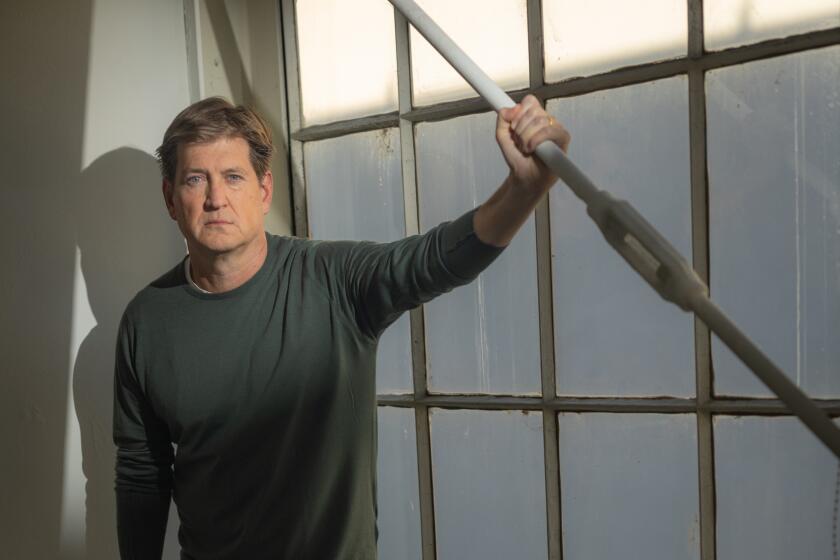Alfre Woodard: The Oscar nominee brings a can-do vibe and her considerable chops to whatever projects she takes on, such as her new film and a TV series.
Alfre WOODARD seems downright giddy. Perhaps it’s the white baby-doll dress on this hot summer day, or the fact that she has a new movie (Tyler Perry’s “The Family That Preys,” with Kathy Bates) and TV series (“My Own Worst Enemy,” with Christian Slater) premiering back to back. Or perhaps she’s still basking in the glow of the Democratic National Convention.
“Oh, darling!” she enthuses, a black-and-white image of Democratic presidential nominee Sen. Barack Obama on a large button by her collar. She had a luxury box for his climactic speech, but “you don’t sit in a box when you’re with 90,000 people and you’re of my generation. You go down to the bottom and you jump and you holler and you spend that afternoon with people.”
“There were like, old people, fat people, gnarled people,” she says, transforming for a moment into a twisted tree, “people that looked like question marks, beanpoles, different ages, all different colors. And everybody was just elated. Nobody was complaining. Everybody was dancing. Old white men dropping it like it’s hot, chanting and shouting. That stadium was filled with possibility.”
The do-si-do in Denver was hardly Woodard’s first political dance; she walked precincts with her parents during the civil rights movement. It’s a reminder of just how long the actress, much younger looking than her 55 years, has been around: In a career spanning more than 30 years and about 90 film and television credits, she has collected four Emmys, an Oscar nomination and a host of other awards.
Woodard’s earthily naturalistic acting might seem an odd choice for “The Family That Preys,” considering the larger, somewhat theatrical style of Perry’s morality plays. It’s an approach that, the actress says, essentially encourages audience participation.
“You’re coming into -- I don’t want to call it a brand -- a style, a way of doing things,” Woodard says. “It’s the same way when you’re going into Chinese opera or Spanish national theater. You sort of come to visit in that style, and Bates and I both agreed to go there together.”
She has plenty of praise for Perry, particularly for his respectful direction and warm treatment of the actors and crew.
“He’s got an operation where a lot of people work in Atlanta. They’re all together all the time. They’re all polite and considerate because they’re Southern. So they have this security -- there’s no transience, there’s no questions, so it is like going into a world that is established; even the production environment.”
Having waited “20 or 25 years” to work together, Woodard and Bates made the most of it, putting their distinctive stamps on their characters.
“I don’t know if Tyler really knew any women who were our age,” says Woodard. “It’s knowing what women say together, what women do. I think we were a lot more feisty and bawdy than he expected us to be.
“I think my character, Alice, was intended to be a lot more staid. I just felt like, you don’t want to give Christians a bad name. If you’re really a Christian, you go along with that ‘Good News’ part of it instead of ‘I’m waiting to die so I can go to heaven’ or condemning you to hell. So she should be a happy Christian!”
Woodard takes that kind of cheery dedication with her across genres in her own work, shrugging off any potential medium shock in switching from films such as Perry’s to other movies, to series television.
“I’m never shocked. I’m an actor. Have acting; will travel,” she says with a wave. “When I was in my early 20s, I did a bus-and-truck tour of Yugoslavia, doing scenes from American theater. I learned a play, phonetically, in Serbo-Croatian, called ‘Vlast.’ I knew basically what I was saying, paragraph by paragraph. I was playing a classic Yugoslavian character, the village gossip, so she’s meant to just gossip all the time. They said, ‘Just keep talking, keep improvising.’ ‘Oh, great.’ So I would say the lines and then just pick one and keep saying it. Of course, they thought it was hilarious. But the point is, what you do, your gift to connect, should remain constant.”
--
(BEGIN TEXT OF INFOBOX)
Where you’ve seen her
Alfre Woodard has racked up about 90 film and television credits, starting with the 1978 filmed play “The Trial of the Moke” with Samuel L. Jackson. Coincidentally, that was directed by Stan Lathan, whose daughter, Sanaa, plays Woodard’s daughter in the current theatrical release “The Family That Preys.” Dotting her varied filmography are “Star Trek: First Contact,” “Cross Creek” (for which she received an Oscar nomination), “Passion Fish,” “Crooklyn” and “Mumford.” On TV, her turns in “Desperate Housewives,” “Hill Street Blues” and “L.A. Law” garnered her some of her 14 Emmy nominations. She has four Emmy wins and a Golden Globe (for “Miss Evers’ Boys”) among her many accolades.
More to Read
The biggest entertainment stories
Get our big stories about Hollywood, film, television, music, arts, culture and more right in your inbox as soon as they publish.
You may occasionally receive promotional content from the Los Angeles Times.










